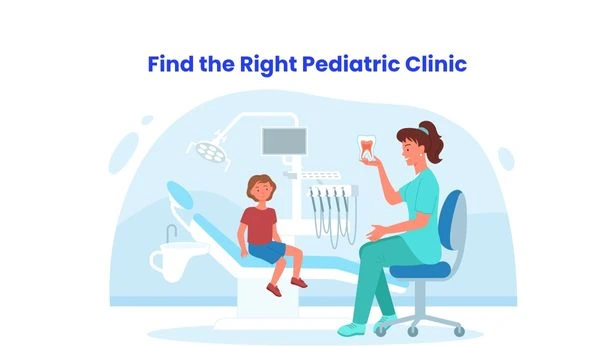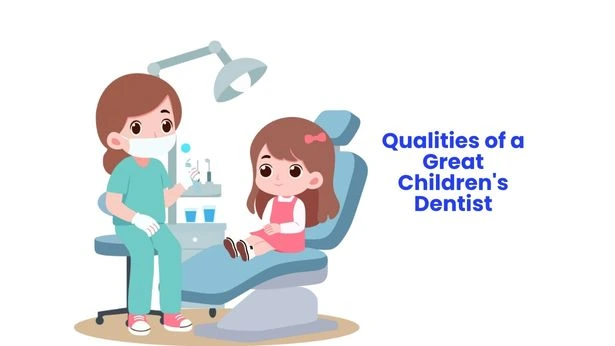Top Tips for finding a good kids Dentist Near You
How to choose a pediatric dentist—and tips for finding a good kids dentist—top the list of important decisions parents make for their child’s oral health journey. When you pick a pediatric specialist who brings the right mix of professional skill, empathy, and preventative care, your child’s visit will feel safe and comfortable.
These positive early experiences often spark good dental habits long into adulthood. This blog gives you clear, practical tips for finding a good kids dentist, presents a simple pediatric dental clinic selection guide, and details exactly what to look for in a children’s dentist to help you make a confident choice.
Essential Tips for Choosing The Best Pediatric Clinic

Discover the key factors to consider when selecting the right dental care for your child. These tips offer practical tips to find the best pediatric clinic confidently.
1. Warm, Welcoming Environment: Think of the best children’s play space: bright colors, friendly illustrations, toys or storybooks, maybe even a mural or two. That’s the kind of atmosphere you want in a pediatric dental clinic. After all, when a child is welcomed with kindness and creativity, dental visits become something they only half‑expect part giggle, part curiosity but hardly anxiety‑provoking.
2. Specialized Pediatric Training: Behind every great kids’ dentist is advanced training focused on children’s oral health. Pediatric dentists complete additional schooling beyond general dental training, covering tooth development, behavior guidance, early orthodontic indicators, and treatment techniques suited to little ones.
Make sure the dentist you choose has pediatric credentials—board‑certified or board‑eligible, with an active license. That depth of expertise means the clinic knows exactly how to address young patients’ developing teeth and evolving personalities.
3. Behavior and Comfort Techniques: Careful communication makes all the difference. They might introduce the mirror or suction tool on a stuffed animal first, describe each step in a friendly voice, and reward with a sticker. When parents research tips for finding a good kids dentist, look for mentions of emotional awareness, gentle strategies, and patience they signal staff who genuinely understand how to put children at ease.
4. Preventive Care and Education: In pediatric dentistry, clinics that prioritize cavity prevention through cleanings, fluoride varnishes, sealants, and nutritional guidance show real commitment to long‑term health. A top clinician will walk you through home brushing techniques like using a pea‑sized amount of fluoride toothpaste and advise snack swaps to protect enamel.
A thoughtfully prepared care plan updated at every visit and tailored to your child’s stage of dental development is the backbone of any trusted pediatric dental clinic selection guide.
5. Accessibility and Convenience: You don’t want to let logistics trip up good dental habits. Flexible appointment hours evenings, early mornings, or weekends are a real plus. So is a clinic located near your home, daycare, or school. Before committing, ask if they accept your insurance or provide clear, upfront pricing.
A friendly, well‑organized front office that keeps scheduling simple shows they respect your time and reduce stress around each visit.
6. Safety, Cleanliness, and Emergency Preparedness: No detail is too small when it comes to hygiene. A high‑quality pediatric clinic uses sterile instruments, visibly updated infection‑control protocols, and clean dental stations. You might even see staff washing hands or donning fresh masks between patients. Emergency readiness matters too: confirm that the team is trained in pediatric CPR and has a plan for urgent situations.
Clinics that openly discuss their safety standards help parents feel secure in choosing their practice.
7. Parental Involvement and Communication: Your role in your child’s care is central. A clinic that welcomes you into the room, invites your questions, and shares clear, jargon‑free explanations about procedures helps build trust. After each visit, you should leave with written or verbal follow‑up guidance regarding brushing habits or next appointments.
A caring dentist will treat your child as their own, answer your concerns thoughtfully, and partner with you in every step of their oral health journey.
8. Emergency Care and Referrals: Children can crack a tooth on the playground or wake up with sudden pain. A responsive pediatric dentist gives you a way to reach them outside regular hours either through emergency visits, callbacks, or weekend slots. Plus, a well‑established clinic should have connections to specialists such as pediatric orthodontists, oral surgeons, or sedation providers and be ready to give referrals seamlessly if advanced care is required.
9. Reputation, Reviews, and Recommendations: Hearing from other parents can be powerful. Ask friends or your pediatrician for pediatric dentist recommendations. Online reviews also help. If reviews repeatedly mention scheduling issues or unhappy encounters, consider that a red flag. A clinic with consistent positive feedback is usually doing something right.
10. First Visit Assessment: Your child’s initial visit is your best chance to evaluate if the clinic feels right. Notice how they greet your child? Are they calm, encouraging, patient? Does the dentist explain everything with simple words and take time to listen to your questions? A good first visit should leave your child comfortable, you informed, and both of you excited to return.
It’s a key step in deciding based on your pediatric dental clinic selection guide criteria.
Also Read: What Does A Pediatric Dentist Do?
What to Look for in a Children’s Dentist?

Look for a dentist with specialized pediatric training, a gentle approach, and a fun, welcoming environment. Clear communication and a focus on prevention are key.
- Specialized training: board‑certified in pediatric dentistry, knowledgeable about children’s oral development.
- Child‑friendly setting: playful décor, toys, child‑sized tools, comforting touch.
- Gentle behavior techniques: praise, distraction, modeling, age‑appropriate talk.
- Preventive care focus: fluoride, sealants, healthy diet advice, regular cleanings.
- Ease of access: flexible hours, good location, clear insurance/payment policies.
- High safety standards: sterilized tools, visible protocols, emergency plans.
- Open communication: respectful, inclusive explanations; written or verbal follow‑up.
- Emergency readiness: after‑hour outreach and trusted referrals if needed.
- Positive reputation: heartfelt reviews, recommendations from parents or doctors.
Conclusion
Choosing the right pediatric dental clinic is a meaningful step in ensuring your child’s lifelong oral health. With the right environment, skilled specialists, and a focus on prevention, children can grow up with positive dental habits and little fear of the dentist’s chair. By applying these essential tips for choosing the best pediatric dental clinics, you’re not just selecting a service you’re choosing a partner in your child’s well-being.
Start your search today with confidence. Use this guide to evaluate local clinics, ask the right questions, and observe how your child feels on their first visit. If you’re a clinic looking for top talent, consider working with a pediatric dentist placement agency to connect with skilled professionals.Contact Hire Smiles today to find the perfect match for your dental team needs.
FAQs
Q1. At what age should my child first see a pediatric dentist?
It is considered that generally by age one or when the first tooth is visible.
Q2. Is a pediatric dentist more expensive than a general dentist?
Yes, slightly, but prevention and long‑term care savings usually outweigh that.
Q3. Do pediatric dentists treat kids with special needs?
Many do always ask whether they have experience and accommodations.
Q4. Is fluoride safe for little kids?
Yes, when applied in age‑appropriate amounts based on cavity risk.
Q5. Should a parent stay in the room during treatment?
Most clinics welcome a parent for comfort—though policies vary.
Q6. What if my child needs sedation or braces later on?
A reliable clinic will help you connect with trusted specialists effortlessly.
Q7. How often should my child visit the dentist?
Usually every six months, though visits may be more frequent if needed.
Q8. Do pediatric dental offices handle emergencies?
Many offer on‑call responses, urgent care slots, and recommendations if needed.
Related Article: Top Skills Every Successful Pediatric Dentist Needs





